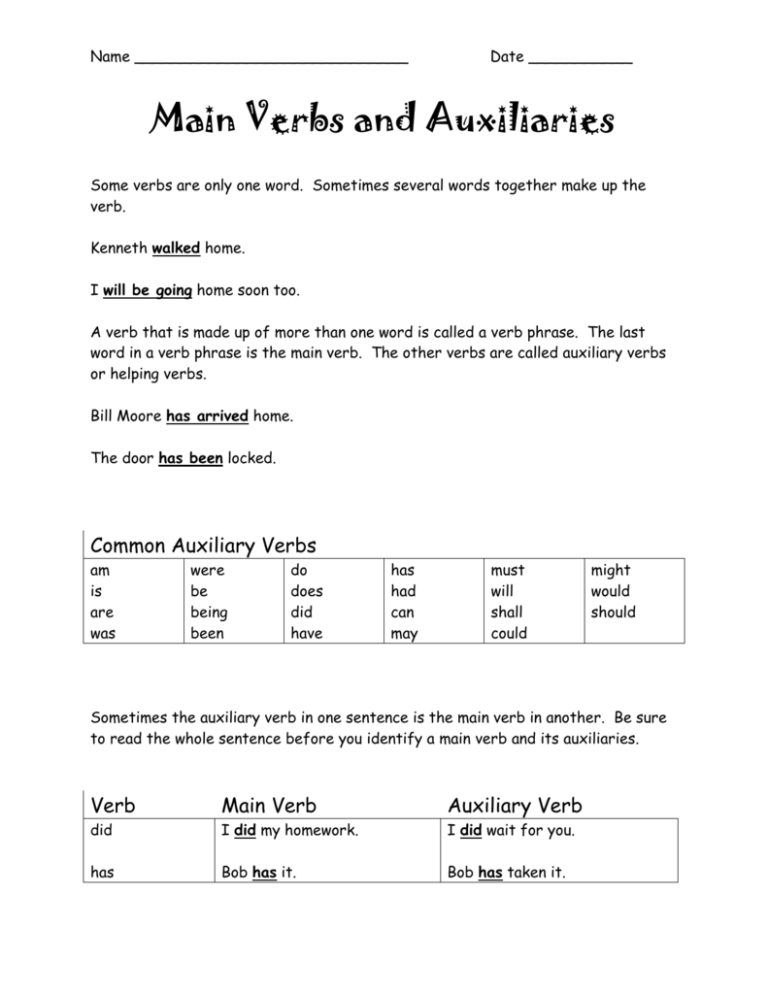Action - MelissaCabe
advertisement

Name _____________________________ Date ___________ Main Verbs and Auxiliaries Some verbs are only one word. Sometimes several words together make up the verb. Kenneth walked home. I will be going home soon too. A verb that is made up of more than one word is called a verb phrase. The last word in a verb phrase is the main verb. The other verbs are called auxiliary verbs or helping verbs. Bill Moore has arrived home. The door has been locked. Common Auxiliary Verbs am is are was were be being been do does did have has had can may must will shall could might would should Sometimes the auxiliary verb in one sentence is the main verb in another. Be sure to read the whole sentence before you identify a main verb and its auxiliaries. Verb Main Verb Auxiliary Verb did I did my homework. I did wait for you. has Bob has it. Bob has taken it. Name _____________________________ Date ___________ Questions are often formed with auxiliary verbs. In questions, the main verb and its auxiliaries may be separated by the subject of the sentence. Should we leave now? Will the show start early? Who would like a ticket? Summing Up: Auxiliary verbs are helping verbs. A verb phrase is made up of one or more auxiliary verbs and a main verb. The main verb is the last word in a verb phrase. Guided Practice Directions: Find the verb phrase in each sentence. Which words are main verbs? Which are auxiliaries? Example: Before 1803 the land between the Missouri River and the Rock Mountains was owned by France. Verb Phrase = was owned Main Verb = owned Auxiliary Verb = was 1. By 1803 this land had been bought by the United States. Verb Phrase = ___________________ Main Verb = ____________________ Auxiliary Verb = _________________ 2. The purchase was called the Louisiana Purchase Verb Phrase = ___________________ Main Verb = ____________________ Auxiliary Verb = _________________ Name _____________________________ Date ___________ 3. The United States had paid fifteen million dollars for this land. Verb Phrase = ___________________ Main Verb = ____________________ Auxiliary Verb = _________________ 4. No one had explored this area. Verb Phrase = ___________________ Main Verb = ____________________ Auxiliary Verb = _________________ 5. Who would explore this land? Verb Phrase = ___________________ Main Verb = ____________________ Auxiliary Verb = _________________ 6. The explorers would be selected carefully. Verb Phrase = ___________________ Main Verb = ____________________ Auxiliary Verb = _________________ 7. A dangerous journey would begin soon. Verb Phrase = ___________________ Main Verb = ____________________ Auxiliary Verb = _________________ 8. Many men would take this trip. Verb Phrase = ___________________ Main Verb = ____________________ Auxiliary Verb = _________________ 9. The journey would last more than two years. Verb Phrase = ___________________ Main Verb = ____________________ Auxiliary Verb = _________________ Name _____________________________ Date ___________ 10. Meriwether Lewis and William Clark were chosen by President Thomas Jefferson. Verb Phrase = ___________________ Main Verb = ____________________ Auxiliary Verb = _________________ 11. They had lived in the wilderness. Verb Phrase = ___________________ Main Verb = ____________________ Auxiliary Verb = _________________ 12. A route to the Pacific Ocean would open fur trading. Verb Phrase = ___________________ Main Verb = ____________________ Auxiliary Verb = _________________ 13. President Jefferson had wanted information about the Northwest. Verb Phrase = ___________________ Main Verb = ____________________ Auxiliary Verb = _________________ 14. Did the travelers have a map of the land? Verb Phrase = ___________________ Main Verb = ____________________ Auxiliary Verb = _________________ 15. Did the explorers leave from St. Louis? Verb Phrase = ___________________ Main Verb = ____________________ Auxiliary Verb = _________________ 16. By 1806 Lewis and Clark had become the first explorers in Idaho. Verb Phrase = ___________________ Main Verb = ____________________ Auxiliary Verb = _________________ Name _____________________________ Date ___________ 17. The Oregon region was claimed by the United States. Verb Phrase = ___________________ Main Verb = ____________________ Auxiliary Verb = _________________ 18. The exploration had opened a new area for pioneers. Verb Phrase = ___________________ Main Verb = ____________________ Auxiliary Verb = _________________ 19. It was considered a great success. Verb Phrase = ___________________ Main Verb = ____________________ Auxiliary Verb = _________________ 20. Should I write a report about their expedition? Verb Phrase = ___________________ Main Verb = ____________________ Auxiliary Verb = _________________ Name _____________________________ Date ___________ Independent Practice Directions: Underline the auxiliary verb once and the main verb twice. Example: A Native American princess may have saved the Lewis and Clark expedition. . 1. Sacajawea was born in Idaho in 1787. 2. She had been kidnapped from her tribe. 3. In 1805 her French husband was hired as a guide for Lewis and Clark. 4. Would the princess stay behind? 5. Could they cross the Rocky Mountains on foot? 6. Horses were needed for that part of the trip. 7. They had met a Native American tribe. 8. The princess had belonged to the tribe at birth. 9. Her brother had been made a chief of the tribe. 10. Her tribe, however, had distrusted strangers. 11. The princess must have helped the explorers. 12. The tribe was given gifts in exchange for horses. 13. The explorers had hoped for information. 14. The tribe did tell them about paths in the mountains. 15. The Rocky Mountains were crossed at last. 16. The trip through the mountains had taken one month. Name _____________________________ Date ___________ 17. Did the explorers return to St. Louis by 1806? 18. They had traveled almost eight thousand miles! 19. People had lost hope for their return. 20. The explorers were welcomed with cheers from the people. 21. Lewis was made the governor of Louisiana. 22. Clark was promoted to a higher rank in the army. 23. Lewis and Clark had written about their journey. 24. Their writing was read by many people. 25. People can read this material today.









